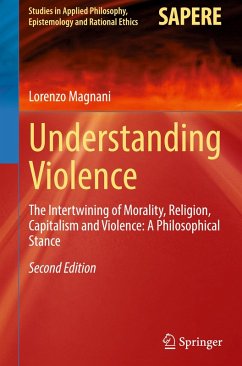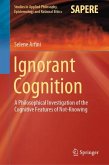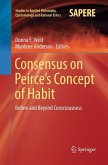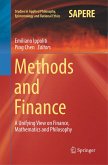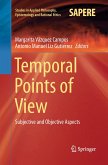This book offers a philosophical account of violence, engaged with both empirical and theoretical debates in disciplines such as cognitive science, sociology, psychiatry, anthropology, political theory, evolutionary biology, and theology. The primary thesis is that violence is intertwined with morality and typically enacted for "moral" reasons. To show this, the book compellingly demonstrates how morality operates to trigger and justify violence and how people, in their violent behaviors, can engage and disengage with discrete moralities. The author's fundamental account of language, and in particular its normative aspects, is particularly insightful as regards extending the range of what is to be understood as violence beyond the domain of physical harm. By employing concepts such as "coalition enforcement", "moral bubbles", "cognitive niches", "overmoralization", and "military intelligence", the book aims to spell out how perpetrators and victims of violence systematically disagree about the very nature of violence. The author's original claim is that disagreement can be understood naturalistically, described by an account of morality informed by evolutionary perspectives as well. This book helps us come to terms with the fact that we are intrinsically "violent beings". To acknowledge this condition, and our stupefying capacity to inflict harm, is a responsibility we must face up to: such understanding could ultimately be of help in order to achieve a safer ownership of our destinies, by individuating and reinforcing those cognitive firewalls that would prevent violence from always escalating and overflowing. This second edition is thoroughly revised and integrated with two new chapters to cover new aspects of violence and its understanding, such as the role of looting finance in facilitating violent outcomes and the attack to scientific cognition and human creativity.
From the reviews:
"This book is an impressive sample of applied philosophy. ... The book basically is a philosophical attempt to give the reader an almost 'metamoral awareness about (the) inherent violent nature of the 'human condition' ... . the central theme of this philosophical study points at a multitude of urgent, highly problematic contemporary issues, and since violence as a structural dimension of life is an understudied theme in (moral) philosophy, let's read, study and discuss this important, thought provoking work!" (Anton van Harskamp, Ethical Theory and Moral Practice, Vol. 16, September, 2013)
"Magnani's book is a broad and deep meditation on the theme of violence. ... the theoretical and methodological problem lies ... to raise this issue to the status of an independent, chiefly philosophical subject. This requires a strategic twofold move: on the one hand, one needs a strong and comprehensive philosophical hypothesis about violence; on the other, it is necessaryto bring ... the fragmentation of analyses consecrated to the issue of violence-and this result is achieved precisely thanks to a comprehensive philosophical hypothesis." (Massimo Durante, Mind & Society, March, 2013)
"Understanding Violence is able to bring all of this home to the reader with such inspired clarity is certain testimony to its potential for everyday application. ... Understanding Violence is a valuable contribution not only to the literature on the subject of violence, but to the possibility of a future with less of it, a shared future forged in mutual understanding rather than Hobbesian force. For anyone invested in engineering such a world, Understanding Violence is necessary reading." (Jeffrey Benjamin White, Biosemiotics, April, 2012)
"The best word to describe this book is "evoking", a book that expressly aims at elevating violence, every kind of violence, to the status of a true philosophical and moral category ... . Magnani's book tackles several fronts with great intellectual determination, each of them as complex as fascinating. ... This book vindicates the intellectual importance of the topic of violence and claims it back into the feud of philosophy. This will surely lead us - at least in the mid-term - to unexplored ontological and epistemological grounds." (Translated from Spanish: Valeria Isegoria in Revista de Filosofía Moral y Política N.º 46, enero-junio, 2012)
"This book is an impressive sample of applied philosophy. ... The book basically is a philosophical attempt to give the reader an almost 'metamoral awareness about (the) inherent violent nature of the 'human condition' ... . the central theme of this philosophical study points at a multitude of urgent, highly problematic contemporary issues, and since violence as a structural dimension of life is an understudied theme in (moral) philosophy, let's read, study and discuss this important, thought provoking work!" (Anton van Harskamp, Ethical Theory and Moral Practice, Vol. 16, September, 2013)
"Magnani's book is a broad and deep meditation on the theme of violence. ... the theoretical and methodological problem lies ... to raise this issue to the status of an independent, chiefly philosophical subject. This requires a strategic twofold move: on the one hand, one needs a strong and comprehensive philosophical hypothesis about violence; on the other, it is necessaryto bring ... the fragmentation of analyses consecrated to the issue of violence-and this result is achieved precisely thanks to a comprehensive philosophical hypothesis." (Massimo Durante, Mind & Society, March, 2013)
"Understanding Violence is able to bring all of this home to the reader with such inspired clarity is certain testimony to its potential for everyday application. ... Understanding Violence is a valuable contribution not only to the literature on the subject of violence, but to the possibility of a future with less of it, a shared future forged in mutual understanding rather than Hobbesian force. For anyone invested in engineering such a world, Understanding Violence is necessary reading." (Jeffrey Benjamin White, Biosemiotics, April, 2012)
"The best word to describe this book is "evoking", a book that expressly aims at elevating violence, every kind of violence, to the status of a true philosophical and moral category ... . Magnani's book tackles several fronts with great intellectual determination, each of them as complex as fascinating. ... This book vindicates the intellectual importance of the topic of violence and claims it back into the feud of philosophy. This will surely lead us - at least in the mid-term - to unexplored ontological and epistemological grounds." (Translated from Spanish: Valeria Isegoria in Revista de Filosofía Moral y Política N.º 46, enero-junio, 2012)

